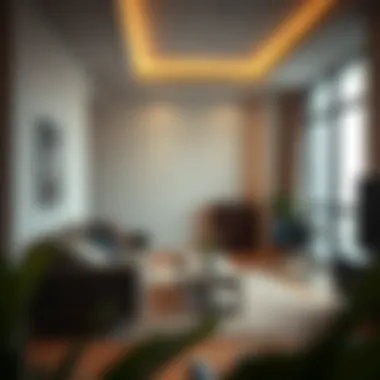Expat Housing Insights: Finding Home in Dubai


Intro
When you land in Dubai, you might be greeted by an impressive skyline, luxury shopping malls, and an array of cultures blending seamlessly together. It’s a vibrant city that beckons expatriates from every corner of the globe. Yet, amidst this allure, choosing the right place to call home can feel like finding a needle in a haystack. Navigating through the housing options in Dubai is pivotal for a seamless transition, especially for those who are new to the expat scene.
Housing in Dubai is as diverse as its population. From luxury lofts with views of the Burj Khalifa to charming villas in peaceful neighborhoods, there’s a little something for everyone. But with this variety comes the challenge of understanding what fits best with your lifestyle, budget, and legal requirements.
In this article, we will unpack the housing landscape in Dubai, diving into different types of accommodation, financial implications, legal requirements, and how culture intertwines with your living situation. With each aspect explored, we hope to assist you in making an informed decision as you carve out your niche in this dynamic city.
Market Trends and Analysis
Navigating the housing market is like riding a roller coaster—up, down, and sometimes dizzying. Understanding the trends and analyzing the current environment will arm you with knowledge and prepare you to make savvy decisions.
Current Market Conditions
Right now, the Dubai housing market is showing signs of recovery after a dip that many attributed to the global economic changes. The demand for rental properties has seen a steady increase, with many expats returning post-pandemic. Rental prices, in many areas, have stabilized, though some districts are witnessing a surge due to heightened demand.
Neighborhoods like Downtown Dubai and Jumeirah are continuing to attract high expat populations, pushing prices upwards. In contrast, areas like Dubai Investment Park are seeing more affordable options, catering to families and those looking for value without compromising proximity to amenities.
Future Projections and Opportunities
Looking ahead, many experts believe that the housing market will continue to flourish. The upcoming World Expo set to take place in Dubai may bring in even more people, further exerting pressure on the rental market. With various government initiatives aimed at attracting foreign investment, there are exciting opportunities for those considering buying property.
"Bigger events like the World Expo always tend to inflate housing demands, which could be an advantage for those looking to invest in property."
Investment Strategies
For those keen on entering the investment arena, understanding the lay of the land is essential to making wise choices.
Best Areas for Investment
For investors, identifying the right neighborhoods can make all the difference. Areas such as Arabian Ranches and Dubai Marina have consistently shown good returns on investment.
- Al Barsha: Known for its family-friendly environment and proximity to the Mall of the Emirates.
- Jumeirah Village Circle (JVC): An emerging favorite offering a mix of affordability and potential high returns.
- Dubai Hills Estate: A new development that is both upscale and family-oriented, appealing to a wide range of buyers.
Tips for Property Investors
Investing is no walk in the park. If you're serious about jumping into the Dubai market, here are some tips:
- Research Thoroughly: Know the neighborhood trends—what’s hot, what’s not.
- Work with Local Agents: They have the pulse of the market and can provide invaluable insights.
- Consider Long-term Gains: Think beyond quick returns; a steady rental income can pay off nicely.
- Follow Visa Regulations: Ensure that all legal requirements are followed, especially for expatriate buyers.
By being informed and strategic, whether you’re renting or buying, you can navigate the diverse expat housing landscape in Dubai with confidence.
Prolusion to Expat Housing
Understanding expat housing in Dubai is like navigating a maze where each twist and turn presents unique advantages and challenges. With a booming real estate market that's constantly evolving, potential expatriates must familiarize themselves with the landscape to make informed decisions about where and how to settle in this vibrant city.
The lived experience of expatriates in Dubai isn't just about the architecture and amenities; it's also about melding into a new culture, adapting to a different way of life, and finding community in a city that often feels like a melting pot of nationalities. In this section, we will outline the significance of comprehending what expat housing entails, specifically delving into the various offerings available, the nuances of renting, and the socio-economic context that shapes the housing market.
Context of the Dubai Real Estate Market
Over the past decade, Dubai's real estate market has transformed into a bustling hub where prices can swing like a pendulum. The introduction of various governmental reforms, like the long-term residency visas, has lured more expatriates than ever before. Currently, the market boasts a let's-say "fluctuating" character, making it imperative for those looking to rent to keep their finger on the pulse. With a wide array of options—ranging from luxury high-rise condominiums to more affordable shared apartment setups—expats are presented with housing choices that can cater to diverse financial capacities.
The location you choose can significantly impact both your lifestyle and budget. For instance, neighborhoods nearer the city center, such as Downtown Dubai, while trendy, tend to command higher rental prices. In contrast, areas further away like Arabian Ranches may offer more spacious living accommodations for a fraction of the price, albeit with a longer commute during peak hours.
Profile of the Expat Community
The expat community in Dubai is not a monolithic entity; it's a dynamic mix of people from all corners of the globe. This diversity is evident in the variety of cultures, languages, and traditions coexisting in this metropolis. There's a balance of seasoned expatriates who have made this city their home for years and newcomers who are just dipping their toes into Emirati waters.
Typically, professionals in sectors like finance, tech, tourism, and education dominate the expat ranks, often seeking a lifestyle that offers both high-quality amenities and enhanced career opportunities. This mixture has resulted in a community that leans toward a cosmopolitan lifestyle, gravitating toward areas with vibrant social scenes, international schools, and comfortable commutes.
**"In Dubai, home isn't just where you lay your head; it's a portal into diverse cultural experiences, or so say the expats who live it daily."
These aspects influence not just the housing preferences but the fabric of daily life, including social engagements and even shopping habits. The stronger the community ties one can build, the smoother the transition into life in Dubai will likely be.
In summary, understanding expat housing in Dubai is essential for making educated decisions, avoiding common pitfalls, and ultimately enjoying the rich experience that this multicultural city has to offer.
Types of Accommodation for Expats
When it comes to living in Dubai, choosing the right type of accommodation plays a crucial role in shaping expatriates' experiences. Dubai's real estate market is as vibrant as its culture, offering a range of housing options to suit varying lifestyles, budget constraints, and familial needs. This section delves into the main types of accommodations that expats can consider, shedding light on their specific attributes, benefits, and what to keep in mind while navigating these choices.
Luxury Condominiums
Luxury condominiums stand out in Dubai's housing scene, offering a blend of opulence and modern conveniences. These high-rise buildings, often found in bustling areas such as Dubai Marina or Jumeirah Beach Residence, provide residents with stunning views and a host of amenities.
Features of luxury condominiums include:
- Top-Notch Facilities: Gyms, swimming pools, and landscaped gardens are commonly available. Some even offer personal concierge services.
- Security: Enhanced security measures, including surveillance and on-site guards, ensure residents feel safe.
- Community Living: Many condominiums foster a vibrant community atmosphere, where networking and social bonding occur effortlessly.


For expatriates accustomed to a high-quality standard of living, these accommodations can serve as both a comfortable home and a stepping stone into Dubai’s dynamic lifestyle. Rental prices can be steep, however, so it's essential to budget accordingly and understand local market rates.
Expansive Villas
Expansive villas cater to those looking for more space, often suitable for families or multi-generational households. They usually come with private gardens, pools, and sometimes even gardens where children can play freely. Areas like Arabian Ranches and Emirates Living are teeming with these stylish options.
Consider these aspects when looking at villas:
- Space and Comfort: Ample living space allows families to enjoy a comfortable lifestyle. Bedrooms are usually larger than in other accommodations.
- Customization: Some villas can be modified according to individual preferences, giving residents a sense of ownership.
- Local Amenities: Many villa communities feature parks, schools, and shops within walking distance.
However, maintenance of these larger properties can be demanding, necessitating occasional additional costs. Expats should factor in these elements when deciding on a long-term rental.
Studio and Shared Apartments
For those entering the Dubai housing market on a tighter budget or looking for flexibility, studio and shared apartments are popular choices among expats. These types of accommodation are located in numerous neighborhoods and can be quite affordable, making them appealing to young professionals or those new to the city.
Key points about studio and shared apartments include:
- Cost-Effectiveness: Generally, these accommodations are significantly cheaper compared to larger units. Renters can find appealing options without breaking the bank.
- Convenience: Many are situated close to public transport or in bustling areas, making commuting a breeze.
- Community Feel: Particularly in shared apartments, residents can meet like-minded individuals, adding a social component to the housing experience.
While privacy might be limited in shared living situations, these dwellings can offer an excellent stepping stone for fresh expats transitioning into the lifestyle of the UAE. It’s advisable to check out the rules and conditions of shared living to avoid potential misunderstandings.
In summary, understanding the types of accommodations available to expats in Dubai can significantly influence one's settling-in experience. Each category brings unique flavors and considerations, urging newcomers to discern what truly aligns with their lifestyle and financial goals.
Key Neighborhoods for Expatriates
When considering a move to Dubai, understanding the neighborhoods is key. Just like a fish needs water, expats need to find the right environment to feel at home. Each area in Dubai has its own personality, attracting different types of individuals and families. Choosing the right neighborhood can greatly influence one's experience, convenience, and overall satisfaction while living in this dazzling metropolis. In this section, we’ll delve into some of the notable areas where expats tend to settle, highlighting what makes each unique and appealing.
Dubai Marina
Dubai Marina stands as a testimony to modern urban development, characterized by its skyline dominated by high-rise buildings. This neighborhood is a hotspot for young professionals and families alike, drawn by the vibrant lifestyle it offers. The marina's waterfront walks, bustling restaurants, and retail outlets make it a lively place to call home.
- Proximity to Workplaces: The area is ideally situated near major business hubs, making commute times shorter for those working in sectors like finance and tech.
- Recreational Offerings: Expats can enjoy kayaking, sailing, and even beach activities, engaging in a lively social scene that thrives throughout the year.
Living here means that convenience is right outside your door; whether it's grabbing a bite to eat or indulging in some retail therapy, Dubai Marina has you covered.
Jumeirah Lakes Towers
Jumeirah Lakes Towers (JLT) presents a unique blend of residential living and commercial opportunities. The cluster of towers set around serene lakes provides a picturesque setting. This area attracts those who appreciate a balanced lifestyle, combining work and leisure seamlessly.
One of the main draws is its affordability compared to nearby districts:
- Cost-effective Living: Often, families find that they get more space for their money compared to areas like Downtown Dubai.
- Community Feel: The layout encourages a sense of community, with family-friendly parks and a variety of dining options appealing to diverse tastes.
JLT also boasts a lively market scene and regular community events that keep individuals engaged and active in the neighborhood.
Downtown Dubai
Downtown Dubai is iconic; it's where the world comes to see the Burj Khalifa and the Dubai Mall. Living in this area means being at the heart of the action.
- Cultural Hub: The district is rich in culture and entertainment, housing theaters, art galleries, and events throughout the year.
- Luxurious Amenities: High-end living options are prevalent—considered a luxury address, it attracts those who desire stylish and comfortable living.
- Public Transport Access: The public transportation system, including the Dubai Metro, facilitates easy commuting in and around the city, making it a convenient choice for professionals.
But it’s not all hustle and bustle. Residents can find quiet spots in parks to escape the urban frenzy.
Arabian Ranches
For expats yearning for a suburban lifestyle, Arabian Ranches offers spacious villas and a true sense of community away from the crowded city center. The area is ideal for families looking for tranquility and safety.
- Family-oriented Amenities: Schools, healthcare facilities, and recreational parks are all located within reach, creating a self-contained environment.
- Green Spaces: With its landscaped gardens and parks, Arabian Ranches provides a refreshing contrast to the high-paced lifestyle elsewhere in Dubai.
- Community Activities: Regular events promote neighborhood engagement, fostering relationships among residents, transforming neighbors into friends.
Its peaceful ambiance makes it a sought-after destination for those prioritizing a relaxed lifestyle while maintaining access to the conveniences of city living.
"The right neighborhood can turn a house into a home."
Each of these neighborhoods offers distinct perks suited for various lifestyles. As expats navigate their housing decisions in Dubai, prioritizing the right area play a crucial role in their overall experience and satisfaction.
Financial Considerations in Renting
When it comes to renting a place in Dubai, understanding the financial landscape is essential for any expat. The costs associated with renting can add up quickly, and being well-informed can save one from fitting into a financial bind. Knowing what to expect in terms of rental costs, legal fees, and payment structures is crucial when navigating this vibrant market.
Understanding Rental Costs
Rental prices in Dubai can be a bit of a mixed bag; they fluctuate based on the neighborhood, property type, and demand. For instance, areas like Dubai Marina and Downtown tend to command higher rents, often reflecting the luxury lifestyle that comes with them. On the flip side, neighborhoods further out, like Arabian Ranches, can offer more spacious options at a more reasonable price.
It's also important to remember that rental costs may not simply include the rent itself. You often need to factor in utilities, maintenance fees, and even community service charges. Here's a breakdown of potential costs you may encounter:
- Monthly Rent: This is the most obvious cost, but it varies widely.
- Utilities: Electricity, water, and internet can add an extra AED 500 to AED 1,000 per month, depending on usage.
- Community Fees: Many residential areas impose these charges for maintaining common areas and amenities.
Awareness of these associated costs can help avoid unexpected financial strain.


Legal Fees and Deposits
Before signing on the dotted line, it's wise to understand the legal fees and deposits that come into play. Generally, landlords will request a security deposit, usually amounting to 5% of the annual rent for unfurnished properties and 10% for furnished ones. This deposit is held as a safeguard against damages or unpaid rent but is refundable at the end of the tenancy, provided everything's in order.
In addition, you should consider:
- Agency Fees: Hiring a real estate agent usually incurs a fee, generally around 5% of the annual rent.
- Ejari Registration Fee: This is mandatory in Dubai; registering your rental contract with the Real Estate Regulatory Agency (RERA) often costs around AED 200.
Being prepared for these financial obligations can prevent any last-minute surprises when relocating.
Payment Structures and Terms
When it comes to rental payment structures, flexibility is often a strong point in Dubai’s rental market. Typically, landlords prefer annual payments, but there's often room for negotiation. Generally speaking, expats can expect one of these common payment structures:
- Annual Rent Payments: Many landlords ask for one full payment at the start of the lease.
- Semi-Annual Payments: A split payment option is also quite common, making it easier to manage cash flow.
- Monthly Payments: Some landlords may allow for monthly payments, but this is less frequent and often accompanied by a higher overall rent.
Pay attention to the lease terms before signing, as they can affect your budgeting and cash flow throughout the rental period. It’s also worth keeping in mind that landlords sometimes offer discounts for upfront payments, so don’t hesitate to ask about this option.
Understanding the financial components of renting in Dubai is more than just keeping an eye on the numbers. Having a well-thought-out plan based on solid information can make a world of difference in your housing experience.
Legal Framework for Expat Housing
Navigating the maze of Dubai's housing scene requires more than just an eye for aesthetic charm. Understanding the legal framework for expat housing is essential for anyone looking to plant roots in this vibrant city. Contracts, tenant rights, and the regulatory landscape form the backbone of the housing experience for expatriates. Knowing your rights and responsibilities not only helps to protect your interests but also contributes to a more harmonious living environment.
Tenant Rights and Responsibilities
When moving to Dubai, it's vital to arm yourself with knowledge about your rights and duties as a tenant. According to Dubai's rental law, tenants have several rights, including the right to a habitable living environment, privacy, and a fair opportunity to renew their lease upon expiration. However, these rights come hand in hand with responsibilities. For instance, tenants are obligated to maintain the property and adhere to the terms of the lease, which may include restrictions on significant alterations or subletting.
"Knowing your rights is like having a shield; it protects you from potential pitfalls in the rental journey."
Being aware of local regulations can help you avoid misunderstandings with landlords. For instance, the rental market in Dubai operates largely on the principle of "free market", meaning landlords have the leeway to set their prices. However, increases in rent are subject to strict regulations as well, ensuring that exorbitant hikes are kept in check, safeguarding tenants from being priced out.
Contracts and Agreements
Contracts in Dubai’s housing market carry significant weight, and they’re more than just a formality. Those agreements outline everything from rental amounts to maintenance responsibilities and duration of stay. It is essential for expats to read every word carefully and, if necessary, seek clarification where ambiguity lurks. Contracts typically fall under the purview of Dubai's Land Department, ensuring legitimacy.
Several crucial elements make up a well-crafted rental contract:
- Duration of Lease: Specifies the length of time the agreement is in effect.
- Rental Price: Outlines the exact amount due each month, along with any utilities covered.
- Security Deposit: Indicates the amount that will be held to cover potential damages and conditions under which it may be withheld.
- Termination Clauses: Details how either party can legally terminate the agreement.
Failure to comply with these terms may leave expats vulnerable to disputes. Thus, ensuring all parties understand their obligations can prevent complications down the line.
Dispute Resolution Mechanisms
In the unfortunate event of a disagreement, knowing the available dispute resolution mechanisms can be a lifesaver. Dubai offers various options for tenants and landlords to resolve conflicts without escalating into lengthy court battles.
- Mediation: This is often the first step, where both parties come together with a neutral third party to find common ground.
- Rental Dispute Center: A specialized service provided by the Dubai government, this center handles disputes professionally and efficiently. It is an invaluable resource for expatriates unfamiliar with local laws and processes.
- Legal Action: As a last resort, tenants may take a matter to court. It’s crucial to compile documentation, including your lease agreement and correspondence with your landlord, to substantiate your case.
By understanding these mechanisms, expats can confidently navigate through potential conflicts and ensure their housing experience remains as smooth as possible. The legal landscape around housing may feel daunting, but with the right information, expatriates can protect their interests and avoid being caught off-guard.
Relocation Challenges
Relocating to Dubai is an exciting adventure, but it comes with its fair share of hurdles that expatriates need to be aware of. Understanding these challenges is crucial because they directly impact how smoothly one can transition to a new life in this bustling metropolis. From cultural adjustments to navigating local customs, each aspect plays a pivotal role in ensuring a successful relocation.
Cultural Adjustments
Moving to a new country is never just about changing your address. It’s about stepping into a completely different world, where traditions, languages, and social norms may not align with what you’re used to. In Dubai, the blend of modernity and tradition can be astonishing. Expats often find themselves adjusting to local norms that might be quite different from their own.
For instance, the way people communicate can differ drastically. In many Western cultures, a straightforward approach is often appreciated. However, in Dubai, an indirect style can be more common and considered polite. Recognizing this can help avoid misfortunes and misunderstandings with neighbors and coworkers.
Moreover, getting accustomed to local holidays, dress codes, and social etiquette is essential. It’s not just about fitting in; it’s about respecting the rich cultural fabric of Dubai. Understanding these nuances can foster positive interactions, making one's new home feel much more welcoming.
Navigating Local Customs
Becoming familiar with local customs requires a bit of diligence, but it's rewarding in the long run. Dubai is a melting pot, home to people from all corners of the world, yet it still holds tight to its Islamic values. For instance, knowing the prayer timings can be beneficial, especially if you're planning business meetings or social outings during those times.
In everyday situations, common courtesies like saying "Salam Alaykum" when greeting someone can foster goodwill. Additionally, understanding the significance of Ramadan and how it affects daily life can enhance your experience here.
Surprisingly, local customs also extend to commercial practices. For instance, haggling is a norm in local markets, while fixed pricing rules the stores in malls. Navigating these customs might take a little trial and error, but it often leads to interesting conversations and deeper connections with the local populace.
Building a Community and Support Network
One of the silver linings of moving to a new city is the opportunity to build a network from scratch. Creating a support system is vital for expats to thrive in Dubai. Whether it’s connecting with fellow expatriates or making friendships within the local community, having a reliable support network can ease feelings of homesickness and isolation.
Today, there are various platforms and groups dedicated to expats in Dubai, from Facebook groups to community centers, where people gather for shared interests. Joining clubs, attending events, or simply engaging in local activities can open doors to new friendships.
"Connecting with others is not just about sharing experiences but also about enhancing your understanding of a place that will be your new home."
In addition, establishing relationships can be advantageous for professional opportunities. Many industries in Dubai are interconnected, and forging relationships may lead to job prospects or networking avenues that wouldn't typically be accessible.


Benefits of Living in Dubai as an Expat
Living in Dubai as an expatriate is more than just a change of scenery; it's stepping into a world where the advantages can significantly shape your lifestyle and future. To navigate through the complexities of expat housing effectively, it’s essential to grasp these benefits, as they impact decision-making about where to live, how to set your budget, and what lifestyle adjustments to anticipate.
Tax Implications
One of the crown jewels of moving to Dubai is the appealing tax structure. Dubai is part of the United Arab Emirates, which boasts a no personal income tax policy. This is a refreshing break for many expats coming from countries with high tax rates. While you do not have to part with a slice of your earnings each month, it’s key to keep in mind that certain indirect taxes do exist.
For example, the 5% Value Added Tax (VAT) on most goods and services can feel peculiar at first. Property-related costs, like municipality fees, can also catch you off guard if you are not accustomed to additional expenses like these. The lack of a personal tax means more disposable income to spend on housing, education, or leisure activities—a promising factor when considering your lifestyle as an expatriate.
Access to Services and Facilities
Dubai excels when it comes to infrastructure and services. From luxury shopping malls to well-maintained public parks, the city embodies a lifestyle of convenience and comfort. Expats will find an impressive array of services available at their fingertips, ranging from top-tier healthcare facilities to international schools that cater to children from diverse backgrounds. The high standard of living translates into access to:
- World-class Healthcare: Hospitals like the Cleveland Clinic Abu Dhabi or American Hospital Dubai offer exceptional care, often at lower costs compared to similar facilities in the West.
- Educational Institutions: Schools, such as Dubai American Academy or British School Al Khaleej, have curricula aligned with various national standards, making it simpler for your kids to integrate.
- Recreational Facilities: With countless gyms, pools, and entertainment venues available, residents can maintain an active lifestyle that suits their tastes.
Quality of Life Considerations
Quality of life in Dubai is a mosaic made up of various factors that cater to expats’ needs. The relative safety of the city, low crime rate, and a vibrant, multicultural community foster an inclusive environment. Life in Dubai can feel like a grand adventure yet to unfold, contributing positively to the well-being of individuals and families. It’s worth noting:
- Cultural Diversity: Interacting with people from a multitude of backgrounds enriches the social fabric of expat life. This cultural mosaic allows for refreshing experiences and new perspectives.
- Infrastructure and Transportation: The well-connected metro system and extensive road networks make commuting easier. Local transportation options reduce the frustration often found in larger cities, which can add to your overall satisfaction.
- Leisure Activities: From fine dining to desert safaris, Dubai offers an array of activities that cater to various interests. Whether you possess an affinity for cultural pursuits or outdoor adventures, there's no shortage of choices to keep life exhilarating.
"In Dubai, the blend of modernity and tradition creates an unparalleled lifestyle for expatriates."
Property Management for Expat Rentals
Understanding the nuances of property management is vital for expats looking to settle down in Dubai. It can often make the difference between a comfortable living experience and one filled with unnecessary stress. With a bustling real estate market like Dubai’s, having expert guidance is invaluable, especially when navigating the complexities of rental agreements, maintenance issues, and local regulations. Expats might find the local customs and practices surrounding property management quite different from their home countries, making knowledgeable management services even more crucial.
Understanding Property Management Services
Property management services act as intermediaries, ensuring that properties are taken care of while also representing the interests of the landlord. These firms handle a variety of tasks, including:
- Rent Collection: They manage the financial aspect of property rentals, ensuring timely payments from tenants and setting up automated systems if required.
- Property Maintenance: This includes regular check-ups and immediate repairs, allowing expats to focus on settling into their new lives without the hassle of minor fixes or emergency situations.
- Tenant Screening: A reputable management firm conducts background checks and screenings to verify the eligibility of expats, promoting a stable rental community.
In Dubai, where demand often overshadows supply, property management firms also engage in marketing vacant properties effectively. As a result, landlords have a quicker turnaround on tenancy, while new renters are presented with suitable options based on their needs.
Choosing the Right Management Firm
Selection of a property management firm can significantly influence the rental experience. Not all companies are created equal; thus, expats should consider certain criteria, such as:
- Reputation: Look for firms with a robust track record and positive testimonials from other expats. Online platforms like Reddit can provide insights from real renters.
- Local Expertise: A company with local knowledge can navigate the unique market conditions and cultural nuances effectively. This aspect can save time and avoid potential pitfalls in the rental process.
- Transparency: Ensure that the firm outlines all fees and services provided, establishing a clear understanding before entering into any agreements. Unexpected costs can be a deal-breaker.
Choosing wisely means that expatriates can ease much of the uncertainty associated with relocating, allowing them to enjoy their time in Dubai.
Maintenance and Service Protocols
Effective maintenance protocols are another cornerstone of property management that can heavily influence an expat’s experience. Having clear and efficient systems in place means that when an issue arises, whether it’s plumbing or electrical, the response is swift.
- 24/7 Availability: Management firms that offer round-the-clock support can alleviate significant stress, especially for new arrivals who might not know local service providers.
- Regular Inspections: Proactive management includes scheduling periodic inspections to address minor issues before they escalate into expensive repairs.
- Clear Communication: Establishing open lines of communication between tenants and management facilitates a more harmonious living environment. Quick reporting mechanisms for issues are also advantageous.
When property management breaks down, it can lead to long-term dissatisfaction and financial loss for all parties involved. Thus, selecting a competent management firm ensures a smoother transition and less disruption during an expat’s stay in Dubai.
"Having a solid property management team behind you can turn the overwhelming process of settling into a new country into a seamless venture."
Effective property management is not just about overseeing physical spaces but about nurturing integral relationships that can significantly enhance quality of life for expatriates.
Trends in Dubai Housing Market
Understanding trends in Dubai’s housing market is key for anyone looking to make informed decisions about living arrangements in this vibrant city. With a rapidly evolving real estate landscape, expats must stay abreast of changes that can affect their housing options, whether it be new developments, shifts in rental prices, or changes in legislation that may impact expatriate life. As the market continues to mature, the implications of these trends can directly bnefit or challenge those seeking to find their place in Dubai’s diverse neighborhoods.
Impact of Technology on Housing
The rise of technology has dramatically altered the way people approach housing, and Dubai is no exception. Smart home technology is now a staple in many modern residences. Features like remote-controlled lighting, smart thermostats, and online security systems are not just tech-novelties anymore— they are expected by many potential renters and homeowners. Platforms for online home searches have also transformed how people find housing. Websites like dubizzle, and propertyfinder allow for easy perusal of listings, complete with virtual tours and detailed descriptions.
Moreover, tech-driven property management systems ensure timely communication with landlords and prompt maintenance services, enhancing the living experience. Navigating the housing market has become simpler and more efficient— all thanks to these advancements in technology.
Sustainability and Green Living
As awareness of environmental issues grows, sustainability has become a major consideration in Dubai’s housing market. Developers are increasingly integrating eco-friendly practices into new projects— whether through energy-efficient appliances, sustainable building materials, or the inclusion of green spaces and solar panels.
Apartments in places like Dubai Hills Estate highlight these trends, all while providing appealing amenities that cater to health-conscious residents. Adopting green living practices not only benefits the planet but can also lead to substantial savings on utility bills for consumers.
Key points about sustainable living expenses include:
- Lower energy costs: Using renewable sources can reduce monthly utility bills.
- Improved health: Better air quality and green spaces contribute to overall wellbeing.
- Community value: Areas focusing on sustainability tend to have higher property values, making them a sound investment.
Future Outlook for Expat Housing
Looking ahead, the outlook for expat housing in Dubai seems promising, though not without its challenges. With ongoing investments in infrastructure and a diverse range of housing projects being launched, the variety of options available makes the market attractive. However, potential fluctuations in rental prices due to economic factors and global trends can influence expat decisions.
Aspects to consider for the future include:
- Continued demand in prime areas, like Downtown Dubai, where new infrastructures attract expatriates.
- Emerging neighborhoods such as Dubai South or Nad Al Sheba, which offer more affordable housing options compared to established areas.
Expats must remain adaptable, ready to pivot depending on market shifts and embracing the technological advancements and sustainability efforts that are likely to be at the forefront of Dubai’s evolving housing landscape. Keeping an eye on these trends will ultimately empower expats to secure their ideal living situation while integrating into their new community.











